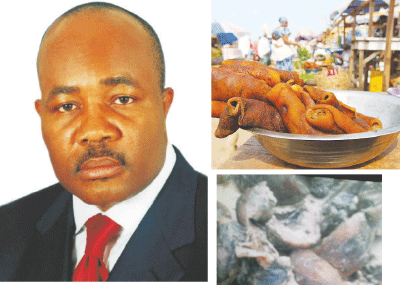An estimated population of three million in Akwa Ibom lives under the threat of an epidemic outbreak traceable to toxic cow hide, known as Kpomo or Ikpa Ebola. Special Correspondent, Emma Ayungbe, investigates.
Poisonous hide and skin meat is sold in markets in Akwa Ibom between 6am and 7am to unsuspecting customers.
Market women who know its health danger are enticed to consuming it because of its affordability, as a N100 worth can prepare soup for a family of six.
One of them, Arit Akpan, said: “I don’t know the supplier but I buy Kpomo in Urua Akpa market. The supplier brings it every Monday night and we buy it in the morning. The skin is cheap and we make a lot of profit from the sale.”
Market women do not know the faces of the suppliers or where their warehouses are located as the nocturnal transaction is shrouded in mystery.
In February, Governor Godswill Akpabio sent a memo to the Ministry of Agriculture and National Resources to ensure that the poisonous hide and skin is flushed out of the markets to stave off epidemic.
Imported from Europe, North Africa
A statement issued by the ministry’s Permanent Secretary, Eking Effiong, confirmed that the hide and skin is smuggled into Nigeria from Europe and North Africa.
Radio campaign
The ministry embarked on public enlightenment on Akwa Ibom State Broadcasting Corporation (AKBC) for four consecutive days, urging the public to desist from its consumption.
Market campaign
The ministry also took the campaign to markets in Ikot Ekpene Council as well as those in Urua Otor, Urua Mbnakara, and Ten Family market.
The team, led by Ikot Ekpene Zonal Veterinary Officer, Emmanuel Iton, included Ofonmbuk Ntuen, Vincent Okon, and Enyekeme Samuel.
Oton stressed in the markets that it is imperative for the people to watch out for the toxic meat following the report of its importation.
Samuel insisted that “the hide and skin meat is harmful to the human body because of the use of toxic chemicals, such as formalin on the meat.”
How to identify Ikpa Ebola meat
The hide is five times bigger than the normal hide of a cattle. It looks very attractive with a light brown colour. But it has an unpleasant odour, and decomposes very fast.
The meat is regarded as nutritious and a show of class in local markets, where consumers hurriedly buy it with little or no information on its source.
Source of supply
Ikpa Ebola is believed to be smuggled into Nigeria from Europe and North Africa.
One of skin recovered from sellers in Ikot Ekpene had a tag with the inscription NORWAY but without contact number.
Danger of its consumption
Medical experts say the hide contains a chemical called formalin. The chemical, which is used to embalm corpses, is used by the smugglers as preservative in conveying the hide for months, depending on the country of export.
The Director Veterinary Services in the Ministry of Agriculture and Natural Resources, Obot Obot, warned that the cumulative effect of consuming Ikpa Ebola is devastating.
“Before now there were no cases of kidney transplant but because of what we eat the cases abound,” he told TheNiche.
“We discovered the toxic hide and skin in the markets when officers of my ministry went to confirm the health condition of cow meat sold, only to see a strange hide and skin sold.
“We promptly confiscated the meat. They took it to our laboratory and discovered that it was preserved with excess salt and formalin which is a very corrosive antiveral object which is very injurious to the health of consumers.”
Obot said his staff, spread all over the 31 councils in the state, trailed the importers and sellers but do not have the mandate to arrest.
Besides, he added, market women become unruly when staff of the ministry try to confiscate the product.
“The toxic meat is imported by big merchants. They don’t have warehouses in the state. They come in the night and deposit the meat in our markets and hurriedly pick their money and drive off.
“As far as urban markets are concerned, it is not on sale. We have confiscated it in urban markets.”
The poisonous hide can cause diarrhea, hypertension, cancer and liver damage due to the high quantity of salt and formalin used to preserve it.














